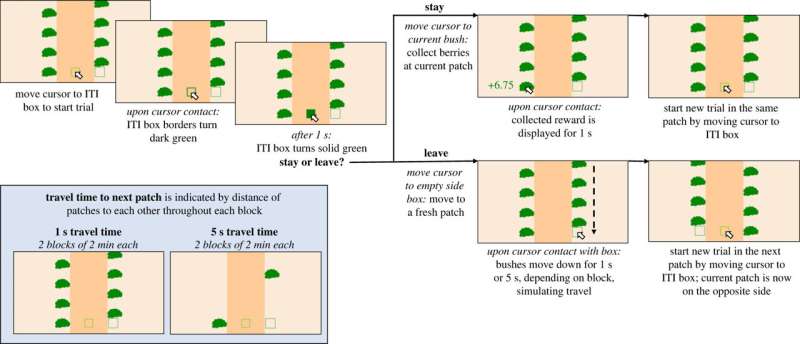Virtual patch foraging task. Participants began each trial by moving their mouse cursor over an intertrial interval (ITI) box. After 1 s delay, the ITI box turned green. Participants next decided to stay at a given patch and gather points ('exploit' decision) or to replenish the patch in exchange for a travel time delay ('explore' decision). Credit: Proceedings of the Royal Society B: Biological Sciences (2024). DOI: 10.1098/rspb.2022.2584
A team of neuroscientists and psychologists from the Perelman School of Medicine and the Indian Institute of Technology has found evidence suggesting that early hunter–gatherer groups may have benefited from the behavior of individuals with ADHD.
In their paper published in the journal Proceedings of the Royal Society B: Biological Sciences, the group suggests such individuals may have helped their groups by venturing beyond established boundaries, leading to the discovery of new game to hunt or plants to eat.
People with attention deficit hyperactive disorder tend to have more trouble focusing on activities around them—they may also exhibit restlessness and be easily distracted. Prior research suggests that the condition is inherited and that it may have affected humans for many thousands of years.
In this new study, the research team wondered what genetic advantage ADHD may confer that has led to its persistence. To find out, they conducted an experiment involving 457 volunteers.
The researchers designed a computer game that involved picking as many berries as possible in a virtual world. Picking berries involved hovering a cursor over a berry bush for several seconds and moving the cursor as the harvest declined.
Players also had the option of abandoning a bush to look for and harvest berries from other bushes, but doing so resulted in more time spent foraging. Volunteers were asked to pick as many berries as possible under certain time constraints. All the volunteers were also asked if they had ever been diagnosed with ADHD.
The researchers found that participants with ADHD tended to collect more berries. This was because they were more likely to give up on a given bush when its yield began to diminish. Conversely, those who did not have ADHD tended to over-harvest plants, leading to low yields. The researchers suggest such behavior in the real world could have helped groups of hunter-gatherers survive during lean times, thereby ensuring their gene traits would be passed on.
More information: David L. Barack et al, Attention deficits linked with proclivity to explore while foraging, Proceedings of the Royal Society B: Biological Sciences (2024). DOI: 10.1098/rspb.2022.2584
Journal information: Proceedings of the Royal Society B
© 2024 Science X Network
























